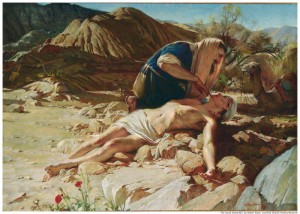While living on Earth, Jesus taught what has come to be known in the Christian world as the Golden Rule. “Therefore all things whatsoever ye would that men should do to you, do ye even so to them: for this is the law and the prophets.
 (See Matthew 7:12.)
(See Matthew 7:12.)
For members of The Church of Jesus Christ of Latter-day Saints, whose members are sometimes called Mormons, this penetrates every aspect of our lives. It is not an instruction just to be obeyed during church. While it seems easy in theory to practice this, in everyday life, it can be challenging to remember it in the heat of battle.
Recently, the Mormons released a plea for a return to civility in both public and private life, centered on the principle of the Golden Rule. The Mormon Ethic of Civility was a firm reminder that civility is a Christ-like principle applicable to all aspects of life. “Latter-day Saint ethical life requires members to treat their neighbors with respect, regardless of the situation. Behavior in a religious setting should be consistent with behavior in a secular setting.”
The statement focused in on politics, one place where even the kindest person might find civility to be a challenge, as he is faced with very strong opinions on how his nation ought to function. Church leaders reminded members the church is non-partisan and that it defies categorization into any single party. Leaders encouraged members to look to the Church’s example in deciding how to approach this challenge:
Civility is not only a matter of discourse. It is primarily a mode of engagement. The technological interconnectedness of society has made isolation impossible. Of all the institutions in the modern world, religion has had perhaps the greatest difficulty adjusting to the reality of give and take with the public. Today, and throughout its history, The Church of Jesus Christ of Latter-day Saints continuously encounters the legitimate interests of various stakeholders in its interaction with the public. Rather than exempting itself from the rules of law and civility, the Church has sought the path of cooperative engagement and avoided the perils of acrimonious confrontation.
A careful study of the Church’s commentary section in the LDS Newsroom can be enlightening for Mormons and others who wish to learn how to tackle controversial topics in a civil manner. While never shying away from proclaiming truth, and while calling for respect, they tackle attacks and sensitive issues in a Christ-like manner and all can benefit from studying their approach.
In a previous release called “The Publicity Dilemma,” the Church offered this counsel:
As Elder M. Russell Ballard and Elder Robert D. Hales of the Council of the Twelve Apostles have both said recently, when expressing themselves in the public arena, Latter-day Saints should conduct themselves with dignity and thoughtfulness.
Not only is this the model that Jesus Christ taught and demonstrated in his own life, but it also reflects the reality of the strength and maturity of Church members today. As someone recently said, “This isn’t 1830, and there aren’t just six of us anymore.
The call for civility referred Mormons to The Book of Mormon, which tells the history of a civilization that revolved often from prosperity to decline. The negative stages of the cycles always began with a decline in civility. Church leaders are concerned about the impact negative political behavior—lying, name-calling, and attacking, rather than polite expressions of opinion and a spirit of cooperation–will have on our nation.
Furthermore, the Church views with concern the politics of fear and rhetorical extremism that render civil discussion impossible.
This is not a new topic for the Mormons. Church leaders have spoken forcefully on this subject in the past. They warn of the dire consequences that can occur when civility is abandoned in favor of less Christ-like methods of politics. One Church leader pointed out we are endangering our entire democratic system when we focus on the negative.
Tirades against men in office or against one’s opponent tend to cause our youth and others to lose faith in the individual and others in government and often even our form of government itself.” (See N. Eldon Tanner, “‘Judge Not, That Ye Be Not Judged’,” Ensign, Jul 1972, 34.)
Gordon B. Hinckley, a former prophet of the Mormons, warned that while we can’t ignore the problems in our nation, we can control where we focus our attention and how we speak. In his mainstream book, Standing for Something, he warned everyone to search for balanced truth and to avoid cynicism. “A sustained diet of a negative point of view has serious repercussions,” he warned. He said such a method for coping with the challenges of the world created a cloud over the nation and made it difficult to find truth. “But if we will turn our time and our talents away from vituperative criticism, away from constantly looking for evil, and will emphasize instead the greater good, America will continue to go forward with the blessing of the Almighty and stand as an ensign of strength and peace and generosity to all the world.” (Hinckley, Gordon B.. STANDING FOR SOMETHING –. New York: Granite Publishers, Inc, 2006. Pgs. 102-103.)
By accepting the Mormon call to civility, we can avoid negativism, and continue to receive God’s blessings over our nation. We need only turn around the question: How would I feel if these words and this method of handling issues were turned against me? How would I want someone who disagreed with me to treat me and to handle the disagreement? The Golden Rule is an infallible way to handle politics wisely, allowing members to be actively participating citizens in the Democratic process while maintaining their position as representatives of the Savior.
The late Terrie Lynn Bittner—beloved wife, mother, grandmother, and friend—was the author of two homeschooling books and numerous articles, including several that appeared in Latter-day Saint magazines. She became a member of the Church at the age of 17 and began sharing her faith online in 1992.





